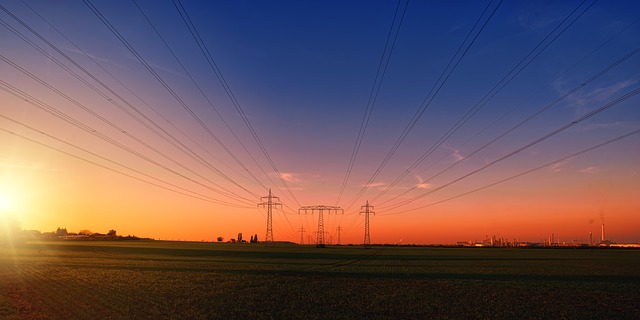Power generation
The term 'power generation' describes the process of generating electrical power. Types of power generation include:
- Fossil fuel thermal energy such as coal or natural gas.
- Biogas energy.
- Geothermal energy.
- Hydroelectricity.
- Wind energy.
- Solar thermal energy.
- Tidal energy.
- Photovoltaics.
- Nuclear energy.
- Chemical energy generated from fuel cells, batteries, and so on.
Power stations are normally located away from centres of population where fossil fuels are abundant or good transport links exist. Many of these locations are well away from the towns and cities where the electricity is used and hence there is a need for electricity transmission and distribution.
The national power supply network is managed by four types of organisation:
- Generators - responsible for producing the electricity.
- Suppliers - responsible for supply and selling electricity to consumers.
- Transmission network - responsible for the transmission of electricity across the country.
- Distributors - those who own and operate the local distribution network from the national transmission network to homes and businesses.
Microgeneration is the local production of power on a very small scale in comparison to the typical output of a power station.
Consumers can qualify for an ‘export tariff’ by selling surplus electricity back to their supplier. Allowable technologies are:
- Solar photovoltaic panels.
- Wind turbines.
- Water turbines.
- Anaerobic digestion (biogas energy).
- Micro combined heat and power (micro-CHP).
NB Net Zero by 2050, A Roadmap for the Global Energy Sector, published by the International Energy Agency in May 2021, suggests that power generation: ‘Refers to fuel use in electricity plants, heat plants and combined heat and power (CHP) plants. Both main activity producer plants and small plants that produce fuel for their own use (auto-producers) are included.’
[edit] Related articles on Designing Buildings
- Arcing.
- Building an electrical grid for our times.
- Dispatchable generation.
- Electricity supply.
- Energy consumption.
- Energy storage.
- Engineering Recommendation G99.
- Fossil fuel.
- Hydroelectricity.
- Micro-grids.
- Microgeneration.
- Oil - a global perspective.
- Power.
- Renewable energy.
- Smart Export Guarantee SEG.
- Solar photovoltaics.
- Substation.
- The future of UK power generation.
- Types of fuel.
- Using P-DfMA to decarbonise coal-fired power stations.
- Watt.
Featured articles and news
Creativity, conservation and craft at Barley Studio. Book review.
The challenge as PFI agreements come to an end
How construction deals with inherit assets built under long-term contracts.
Skills plan for engineering and building services
Comprehensive industry report highlights persistent skills challenges across the sector.
Choosing the right design team for a D&B Contract
An architect explains the nature and needs of working within this common procurement route.
Statement from the Interim Chief Construction Advisor
Thouria Istephan; Architect and inquiry panel member outlines ongoing work, priorities and next steps.
The 2025 draft NPPF in brief with indicative responses
Local verses National and suitable verses sustainable: Consultation open for just over one week.
Increased vigilance on VAT Domestic Reverse Charge
HMRC bearing down with increasing force on construction consultant says.
Call for greater recognition of professional standards
Chartered bodies representing more than 1.5 million individuals have written to the UK Government.
Cutting carbon, cost and risk in estate management
Lessons from Cardiff Met’s “Halve the Half” initiative.
Inspiring the next generation to fulfil an electrified future
Technical Manager at ECA on the importance of engagement between industry and education.
Repairing historic stone and slate roofs
The need for a code of practice and technical advice note.
Environmental compliance; a checklist for 2026
Legislative changes, policy shifts, phased rollouts, and compliance updates to be aware of.


















